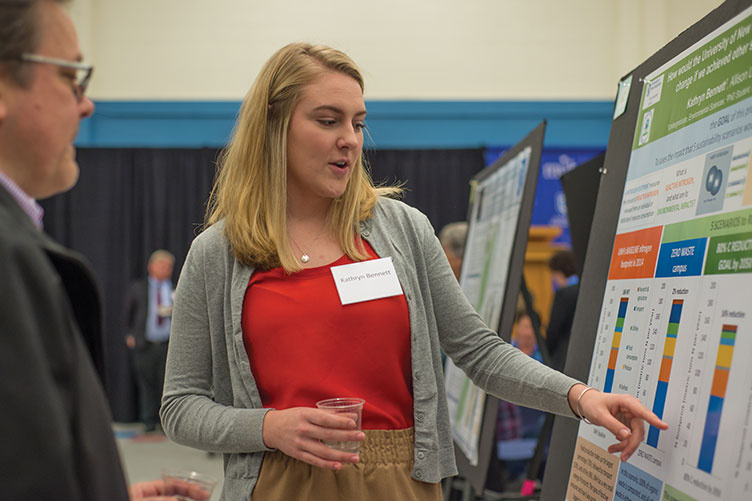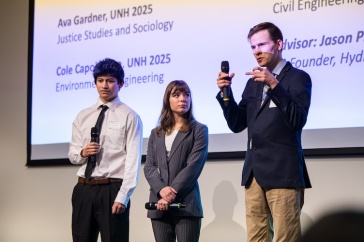
For Kathryn Bennett ’18, a student in the College of Life Sciences and Agriculture, an interest in sustainability began at a young age.
“I have always been passionate about protecting wildlife and our natural world,” the Medway, Massachusetts, resident says, explaining how she would spend summers camping with her family during her childhood. At UNH, she became more involved in sustainability out of a desire to share that love of nature with others, but an introductory-level sustainability course quickly led her to the realization that sustainability is not simply respect for the natural world.

“It also involves making sustainable economic and social decisions,” Bennett says. “This realization has only helped to fuel my passion and inspire me to continue my work to help educate and inspire people to help make our world a better and greener place.”
Last year, Bennett worked with Allison Leach at the Sustainability Institute to calculate UNH’s nitrogen footprint — the term used to describe the amount of reactive nitrogen that is released into the environment as a result of the university’s resource consumption — for fiscal year 2016. She then looked at various scenarios for decreasing the footprint that included becoming a zero-waste campus; achieving the university’s 2050 goal of an 80-percent carbon footprint reduction; and increasing sustainability purchases of local food, organic food or N-efficient (nitrogen-efficient) food, which uses best-management practices to minimize nitrogen outputs from food production.
Bennett’s results, which she shared at the university's annual Undergraduate Research Conference in April, indicated that each scenario would result in a reduction of the campus footprint to different degrees. Perhaps most surprisingly, she concluded that becoming a zero-waste campus would only decrease the university’s nitrogen footprint by 2 percent — in large part because UNH already does an excellent job of minimizing food waste and composting a large amount of food from the dining halls.
The rising senior says one of the most important things to remember about sustainability and protecting the planet is that while these issues can seem daunting and impossible to solve, there is no action that is too small to make an impact. “Each of us can make a difference just by changing our daily choices to become more sustainable, and if we work together and share this knowledge, there is no limit to what we can accomplish,” she says. “Every solution has to start somewhere, and an easy way to start is to just get involved!”
Read more about the overarching story of sustainability at UNH here:
-
Blue and White and Green All Over
-
Farm to Future
-
New Angles on Old Problems
-
A Carbon-Neutral Future
-
People Power
Originally published in UNH Magazine Fall 2017 Issue
-
Written By:
Jennifer Saunders | Communications and Public Affairs | jennifer.saunders@unh.edu | 603-862-3585



















































